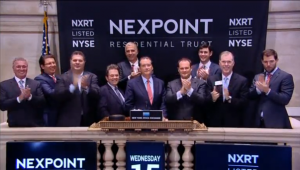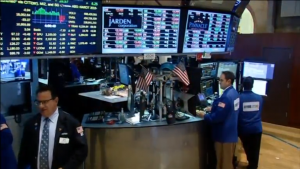JULY 16 (Reuters) — U.S. stocks edged lower on Wednesday (July 15) following comments from Federal Reserve Chair Janet Yellen, as a decline in energy shares outweighed gains in the financial sector.
The energy sector, down 1.6 percent, was the worst performer of the 10 major S&P groups as oil prices retreated on concerns increased exports from Iran will add to a global supply glut. Brent settled down $1.46 at $57.05 while U.S. crude settled down $1.63 at $51.41 a barrel.
Financials, up 0.7 percent, helped curb declines. The group was buoyed by a 3.2 percent rise in Bank of America to $17.68 and a 3.8 percent gain in U.S. Bancorp to $45.53 after their quarterly results.
The S&P snapped a four-session winning streak, its longest run of gains since January.
Celgene climbed 7 percent to $131.39 after touching a record high of $135.98. The company said it would buy Receptos to get a potential multibillion-dollar drug.
Yellen said she expects the economy to grow steadily for the rest of the year, allowing the Fed to hike rates, but gave no direct hint on the timing or pace of a hike. The Fed is broadly expected to hike rates in September or December.
The Fed’s Beige Book showed U.S. economic activity continued to expand from mid-May through June, with lower energy prices helping boost consumer spending but remaining a drag on manufacturing.
The Dow Jones industrial average fell 3.41 points, or 0.02 percent, to 18,050.17, the S&P 500 lost 1.54 points, or 0.07 percent, to 2,107.41 and the Nasdaq Composite dropped 5.95 points, or 0.12 percent, to 5,098.94. 
Corporate America is expected to report its worst sales decline in nearly six years in the second quarter, while profit is expected to have fallen 2.9 percent, according to Thomson Reuters estimates. The effect of the uncertainty in the Chinese markets and the strong dollar will also be in focus.
Yum Brands fell 2.9 percent to $88.88. The owner of Pizza Hut and KFC reported its fourth straight quarter of falling sales, indicating it is still struggling to regain lost ground in China after a food safety scandal last year.
Declining issues outnumbered advancing ones on the NYSE by 1,841 to 1,223, for a 1.51-to-1 ratio on the downside; on the Nasdaq, 1,826 issues fell and 998 advanced for a 1.83-to-1 ratio favoring decliners.
The benchmark S&P 500 index posted 30 new 52-week highs and 16 new lows; the Nasdaq Composite recorded 140 new highs and 64 new lows.
Volume was light, with about 5.8 billion shares traded on U.S. exchanges, below the 6.66 billion average so far this month, according to data from BATS Global Markets.








